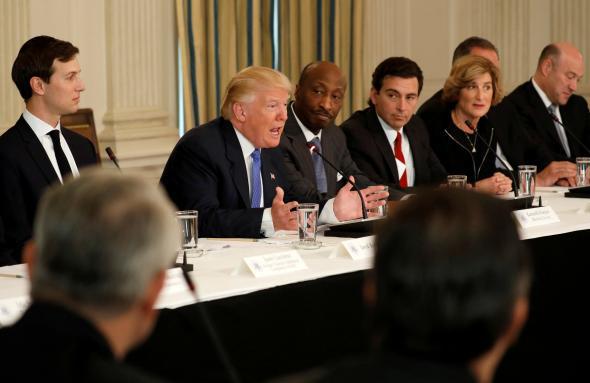Want to listen to this article out loud? Hear it on Slate Voice.
CEOs of large public companies have faced something of a conundrum in the age of Trump. On the one hand, here was a historically unpopular president who lost the popular vote, who is actively hostile to many of the values to which their companies are committed—diversity, inclusion, reckoning with climate change, globalization, free trade, and all the other Davos virtues. Put aside whatever their feelings as individuals are. As leaders of companies with huge global operations and large employee bases, CEOs of large firms have to be careful not to publicly side with someone who is openly antagonistic to their modus operandi.
On the other hand, the federal government—as a policymaker, as a procurement agency, as a customer, as a dispenser of favor and tax breaks, as a rule- and standard-setter—has a great ability to impact the short-term fortunes of many companies. Trump has been in favor of much of what businesses generically want, from lower taxes to lighter regulation. And this window in which Republicans control the White House and Congress presents a rare opportunity for achieving some long-desired goals. (Global companies would really, really like to be able to repatriate all the profits they’re holding overseas on a tax-favored basis.) So the general consensus of CEOs was to not take any rash or immediate action. While it might anger their employees or spouses or children, publicly breaking with and attacking Trump wouldn’t pay any immediate dividends.
There was another reason that CEOs were circumspect. If you run a large, publicly held company, there are norms about the types of things you say. Everyone deserves a chance. We respect the office. When the president of the United States calls and asks you to come to a meeting or to serve on an advisory board, you show up. It’s part of being a public statesman or stateswoman. And with a president who insulted his way to an election victory, there was an extra reason to show up. Those who cross him are likely to be targets.
So you can understand why CEOs like Ken Frazier of Merck and Elon Musk of Tesla and so many others agreed to serve on Trump’s advisory council on manufacturing. They all had specific—and general—needs and asks. Trump would almost certainly be the president for at least the next four years. As one Trump-hostile billionaire put it to me, “He’s got the gavel now.”
But seven months into the Trump administration, we’re seeing that showing up and uttering pro forma support may not be a viable PR, business, or personal strategy for CEOs who want to lead their companies while being true to themselves.
Some CEOs have discovered that mouthing even anodyne support for Trump can have a really negative impact on their business relationships and stock price. In February, Kevin Plank, the CEO of apparel-maker Under Amour and a member of the manufacturing council, said “to have such a pro-business president is something that is a real asset to this country.” In response, some of the company’s leading endorsers, including Stephen Curry, expressed their anger, customers rebelled, and the stock was ultimately downgraded.
Other CEOs have discovered that while the policies of Trump and the GOP may be theoretically good for “business,” they are really bad for their particular business. Duh. Musk was the first to bail from Trump’s manufacturing council after Trump announced the U.S. would pull out of the Paris Agreement on climate change.
Meanwhile, companies are coming to two collective realizations. First, while the Trump administration is delivering favorable policy to energy companies, Wall Street, and for-profit colleges, the prospects for broad-based tax reform (or even tax cuts) aren’t particularly good. Second, given Trump’s unpopularity, his power to inflame the public against any single company has diminished.
Still others have concluded that, regardless of whatever pressure their business might come under, they simply can’t abide sitting quietly while Trump rampages his way through his term. That was the conclusion that Ken Frazier, the CEO of drug giant Merck, apparently reached over the weekend, as a white supremacist rally in Charlottesville, Virginia, turned deadly and Trump condemned the violence only in broad, ambiguous terms. On Monday morning, Frazier announced over Twitter that he was resigning from the manufacturing council.
Why? “Our country’s strength comes from its diversity and the contributions made by men and women of different faiths, races, sexual orientations and political beliefs. America’s leaders must honor our fundamental values by clearly rejecting expressions of hatred, bigotry and group supremacy, which run counter to the American ideal that all people are created equal. As CEO of Merck and as a matter of personal conscious, I feel a responsibility to take a stand against intolerance and extremism.”
Frazier’s move—and note that this is precisely the statement that Trump should have made on Saturday—now puts the other CEOs on the manufacturing council in a tough spot. Each will likely face questions as to what they think about Trump’s response to last weekend’s events and why they remain on the council now that its only black member has resigned.
Frazier has given them all an out if they want it. Sure, Trump responded in typical fashion, immediately attacking Frazier and his company on Twitter:
But it’s not likely Frazier or his firm will suffer any immediate damage. In early trading Monday morning, Merck’s stock was up .8 percent.
